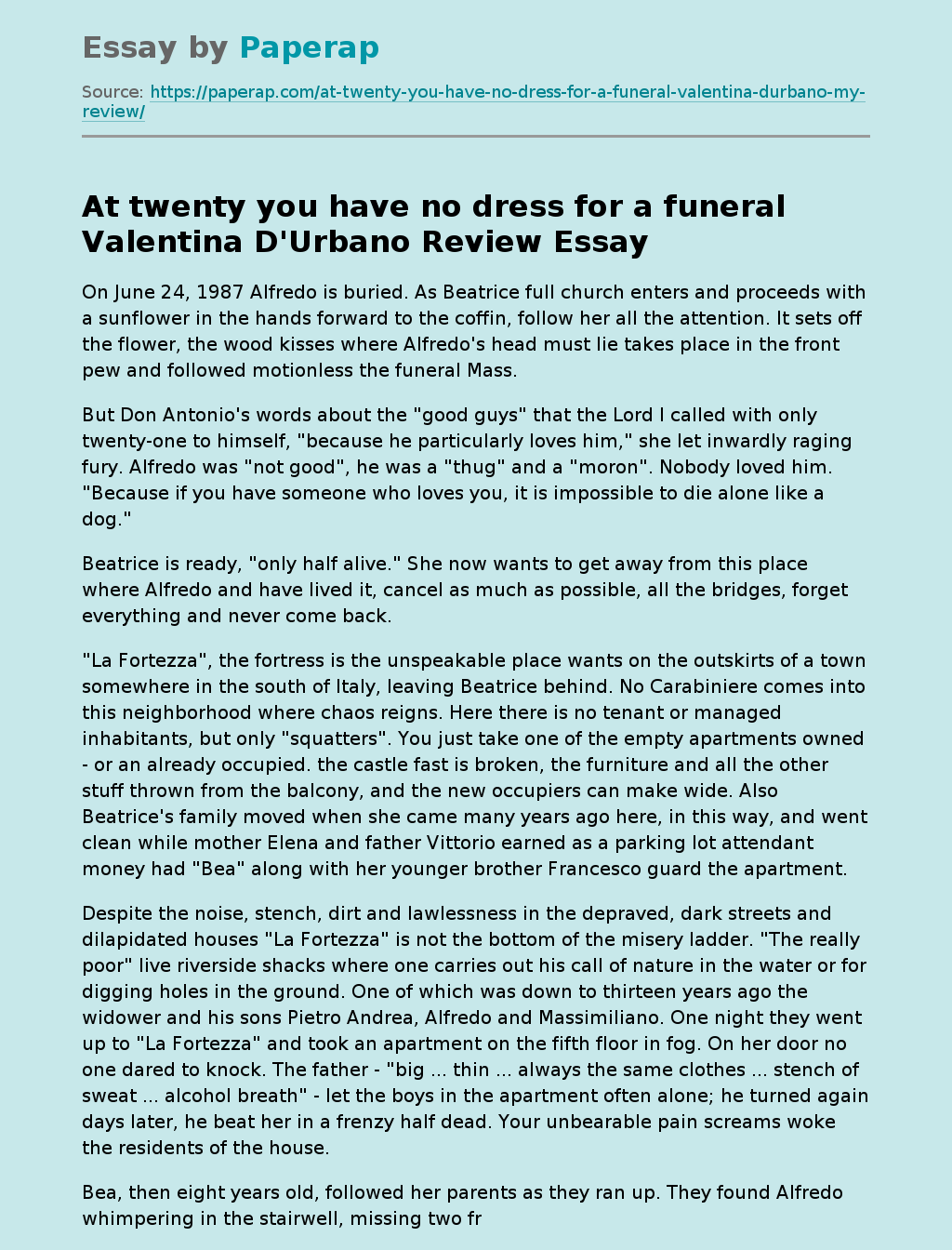Valentina D’Urbano: “The Sound of Your Steps”
On June 24, 1987 Alfredo is buried. As Beatrice full church enters and proceeds with a sunflower in the hands forward to the coffin, follow her all the attention. It sets off the flower, the wood kisses where Alfredo’s head must lie takes place in the front pew and followed motionless the funeral Mass.
But Don Antonio’s words about the “good guys” that the Lord I called with only twenty-one to himself, “because he particularly loves him,” she let inwardly raging fury.
Alfredo was “not good”, he was a “thug” and a “moron”. Nobody loved him. “Because if you have someone who loves you, it is impossible to die alone like a dog.” Beatrice is ready, “only half alive.” She now wants to get away from this place where Alfredo and have lived it, cancel as much as possible, all the bridges, forget everything and never come back.
“La Fortezza”, the fortress is the unspeakable place wants on the outskirts of a town somewhere in the south of Italy, leaving Beatrice behind.
No Carabiniere comes into this neighborhood where chaos reigns. Here there is no tenant or managed inhabitants, but only “squatters”. You just take one of the empty apartments owned – or an already occupied. the castle fast is broken, the furniture and all the other stuff thrown from the balcony, and the new occupiers can make wide. Also Beatrice’s family moved when she came many years ago here, in this way, and went clean while mother Elena and father Vittorio earned as a parking lot attendant money had “Bea” along with her younger brother Francesco guard the apartment.
Despite the noise, stench, dirt and lawlessness in the depraved, dark streets and dilapidated houses “La Fortezza” is not the bottom of the misery ladder. “The really poor” live riverside shacks where one carries out his call of nature in the water or for digging holes in the ground. One of which was down to thirteen years ago the widower and his sons Pietro Andrea, Alfredo and Massimiliano. One night they went up to “La Fortezza” and took an apartment on the fifth floor in fog. On her door no one dared to knock. The father – “big … thin … always the same clothes … stench of sweat … alcohol breath” – let the boys in the apartment often alone; he turned again days later, he beat her in a frenzy half dead. Your unbearable pain screams woke the residents of the house.
Bea, then eight years old, followed her parents as they ran up. They found Alfredo whimpering in the stairwell, missing two front teeth, his face turned swelled a mask of blood, one eye, the other staring at the weeping girl. The parents took him on and umhegten him like their own children. From that moment, Alfredo was to Beas brother.
But their connection is ambivalent. On one hand, they are similar in their appearance and demeanor: “synchronous transparent transition … the same facial expression … same gestures.” The other children call them “the twins”, laugh, clap, sing teasing the wedding march. In fact, they are inseparable, even sleep in the same bed.
On the other hand, they are fundamentally different in their nature. Bea is the “mainstay”, ambitious and domineering, and she is annoyed that Alfredo is so weak-willed, lazy and lethargic. He can barely read and count and throws early in the school out. They argue and wrestle like cats; later slaps and enters Bea the boy. If he resists, he does metered so that he does not hurt her.
It is an unequal kind of love that unites them. Alfredo “was unconditional love … like a dog” while Bea possess it wants to dominate. She hates all that could take away their Alfredo loves friends, girls, especially the violent father, Alfredo, despite everything fully. She does not understand that it hurts him when she imposes on him their will. “I did not understand that he wanted to flee from me that he wanted to escape from himself. That he was the one who was looking for something else.” Alfredo enters into a sexual relationship with another girl, he viewed with barely suppressed aggression, with whom Bea handling has. Then the two youths as two metal balls to swing at each other, against each other collide and back away from each other with undiminished energy.
At a crucial turning it comes as the elder brother Massimiliano on indescribably brutal father Pietro murdered – an act of spiritual liberation. But Alfredo loses the ground under their feet, is a heroin addict. Although Bea gives up her job in a grocery store to serve him around the clock, and he then temporarily defeated his addiction, they can not stop his downfall. At his funeral, she brings her dilemma to the point: “I could not stand that Alfredo … and I loved him more than I ever imagined.”
D’Urbano weaves its depressing depiction social condition with no less desperate story of a troubled relationship between two incompatible young people from this same milieu. There they are asked basically completely on your own; no legal system, no system of values can give guidance, confidence or help them. The only institution that their tackles, is the Church. Narrator Beatrice, the only character who creates the exit, is a strong character, but their chance and their happiness owes it to the unprejudiced pastor and his tireless efforts. He has enabled it to participate in a youth trip to the Adriatic Sea; There she met the friend from Bologna know to which they will eventually draw.
Valentina D’Urbano has a socially critical realism far from any melodrama designed. Your narrative style is fresh, direct, straightforward, the dialogues hit the jargon of the young people. This has brought the book great success in Italy and abroad.
Valentina D’Urbano: “The Sound of Your Steps”. (2019, Nov 18). Retrieved from https://paperap.com/at-twenty-you-have-no-dress-for-a-funeral-valentina-durbano-my-review/

